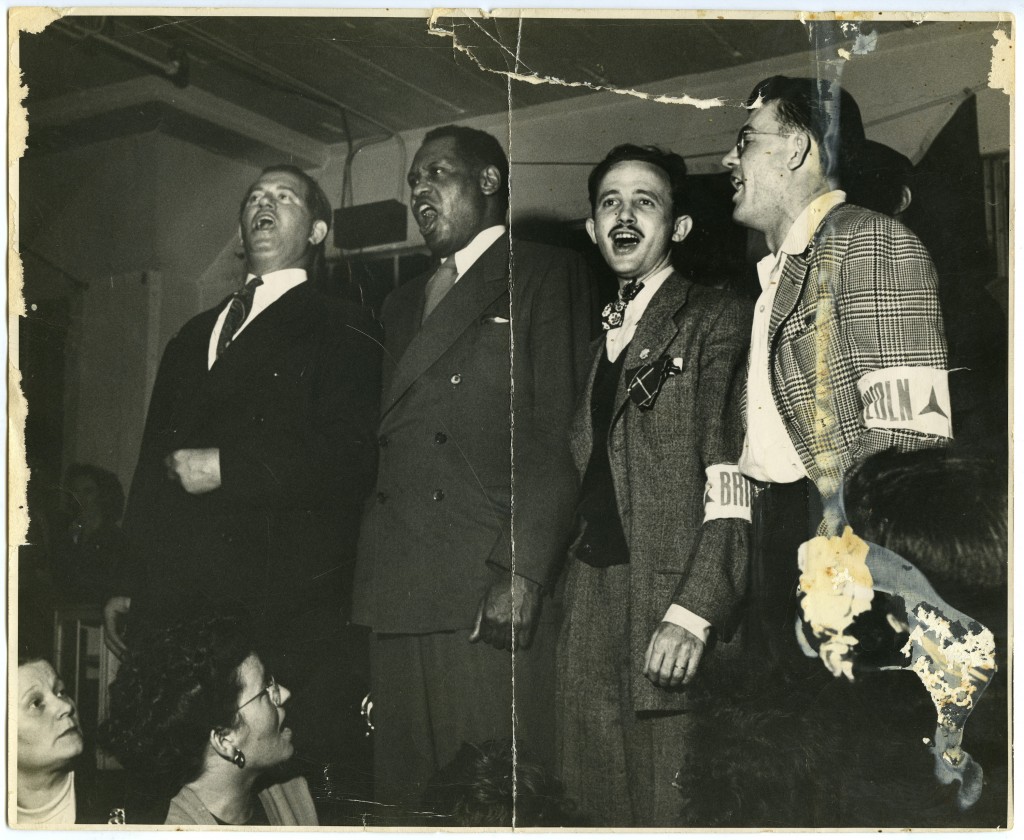In Ireland, Paul Robeson’s Antifascist Internationalism Still Inspires
The Eblana Club in Dun Laoghaire, Ireland, joined in the many celebrations going on this year of the 125th anniversary of Paul Robeson’s birth, when they invited me to address them this past May 25th.
The historic club quickly filled to double its capacity, as more than sixty people from Dun Laoghaire and the Dublin area came to hear about the beloved singer, actor and polymath. The
club manager told me this was a record figure for the Eblana, such was the power of Robeson to still draw such a devoted audience, many of whom came prepared to share their own interpretations of favorite songs from his repertoire after my presentation.
I began by sharing a clip of Robeson performing Joe Hill. I noticed many in the audience were quite familiar with it, spontaneously singing along. I learned that Luke Kelly and the Dubliners had been responsible for widely popularizing the song in Ireland. Des Geraghty, the retired director of SIPTU, Ireland’s largest union, provided another reason for why it was so well known. Following the lecture, he recounted how every union meeting he attended opened with the members singing Joe Hill. As someone from the US, coming from a trade union background, and being raised on Joe Hill, I was so impressed to see how the spirit and universal message of struggle which the song espoused was taken to heart by working people in another country.
Many in the audience also performed the lullabies from Robeson’s repertoire which their parents had sung to them at bedtime. I was pleased to discover another thing in common with them, as Robeson’s oeuvre, including Kevin Barry, The House I Live In and Ballad for Americans were sung to me not only as lullabies, but also served as my history and civics lessons.
This Irish audience was also pleased to learn of Robeson’s close friendship with their own Sean O’Casey. They nodded in recognition as I related Harry Belafonte’s recollection of how he first met Robeson when he came to see Belafonte, Sydney Poitier, Ossie Davis and Ruby Dee rehearse “Juno and the Paycock.” Robeson told the then unknown, struggling actors in the American Negro Theater company that he wanted to be able to tell O’Casey how these young Negro actors brought their own experiences to his play about the grim reality of life in a 1920’s Dublin slum.
My talk was interspersed with clips of Robeson speaking as well as singing, along with many excerpts from his auto biography “Here I Stand”, in an effort to unmute a voice that had been silenced for far too long in retaliation for his activism. As the audience saw and heard and one member observed, he was equally eloquent in speech as well as in song.
They heard Robeson declare Spain, “ the major turning point of my life,” and further explain that it was in Spain that he “came to see that the struggle for Negro rights was an inseparable part of the anti-fascist struggle.” I related how grand daughter Susan Robeson told a Rutgers audience in 2017,” when he came back from Spain, he said, ‘Something in me has changed. Success without benefitting those less fortunate than you is meaningless.”
The talk focused on two fundraisers for medical aid to Spain at Royal Albert Hall, memorable as occasions in which he established his credo of the engaged artist who must take sides, and where he introduced his signature reinterpretation of Old Man River. Indeed, one of the Irish tenors in the audience who performed a stunning rendition of the song, introduced it by saying he had only just learned of Robeson’s modifications in the lecture, and would have to sing the “old words” to Old Man River for us!
Another audience member asked whether Robeson was called to testify before HUAC. Here is a link to an 11 minute excerpt from his testimony, which time did not permit me to include. I did my best to share the gist of it with the audience, and to convey the dignity with which he addressed the committee.
It was only fitting that we also marked the recent passing of Harry Belafonte, a great supporter of the Abraham Lincoln Brigade who had often acknowledged his debt to his mentor Paul Robeson at VALB gatherings. Tributes to Robeson from other generations of artists, from the singer John Legend, the late Whitney Houston, her mother the gospel singer Cissy Houston and the film maker Steve McQueen were also conveyed.
We all took heart from footage of the US Canadian border Peace Arch concerts, which represented a victory over the scourge of McCarthyism in circumventing the black list on Robeson.
During the evening’s Q and A the emcee said he understood why my father’s history as a VALB had inspired me to work on Alba’s Board, but asked what had motivated me to pay this tribute to Robeson. It caused me to reflect that both VALB and Robeson had in common neglected and suppressed legacies and that it would profit everyone who learned of the courageous examples of their intertwined histories. Further, the silencing of Robeson’s voice on the concert stage and in print did an injustice not only to him, but deprived all of us of the sublime achievement that was his talent.
I was honored to join with the Eblana Club in this year of 125th birthday commemorations, and to see how firmly he was lodged in their hearts as an artist and humanitarian, proof that those who sought to erase his influence and achievements, to render him invisible, were not successful.
Nancy Wallach serves on ALBA’s Board.













